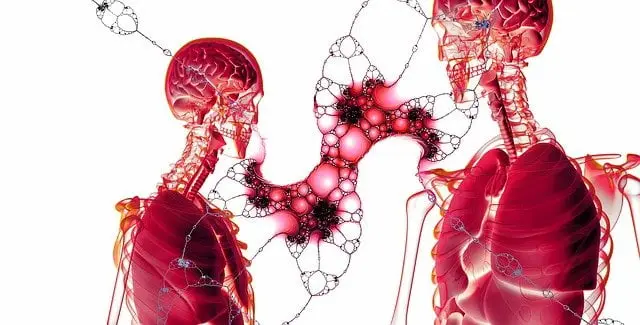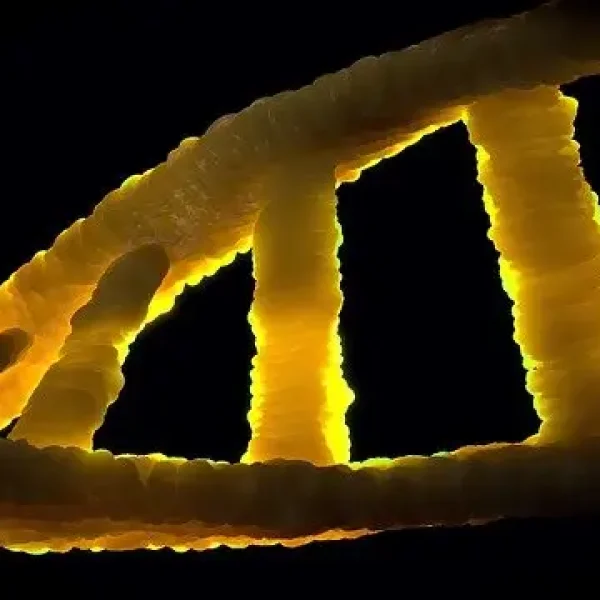Identifying Biomarkers and Disease Mechanisms with Protein Arrays
Frameshift mutations are commonly the cause of severe pathologies, but they are in many cases neglected by researchers, even though their discovery often leads to a significant breakthrough. This is mainly due to the great difficulties associated with frameshift analysis until now. Protein arrays can be used to research these aberrant peptides and provide insight into the pathogenic processes they induce.
Frameshift research can improve patient care, new treatments or greater understanding of a disease mechanism. These mutations play a key role in various diseases like cystic fibrosis and Huntington’s Disease — but in this article, we focus on cancer research and how engine protein arrays can support frameshift biomarker discovery.

What are Frameshift Mutations?
Frameshift mutations are insertions or deletions of any number of nucleotides not divisible by three. This is due to the fact that nucleotides are read and translated to an amino acid in triplets. These ‘indels’ in the genetic code have been linked to a diverse array of diseases. Given they directly cause, the production of incorrect proteins as well as truncated or abnormally long proteins, their key role in many pathogenic mechanisms is unsurprising.
Frameshift Mutations in Cancer
Mutations in various Cancer Types
Examples of frameshift discoveries in cancer leading to improved patient care, new treatments or greater understanding of a disease mechanism are numerous. For instance, studies on lung cancer, melanoma and renal cell carcinoma described an elevated number of frameshift mutations to be a very significant indicator of immune checkpoint inhibitor treatment response (Chae et al., 2019; Hanna et al., 2018).
Immonogenic Frameshift Peptides
Furthermore, mismatch-repair deficient tumors have been found to commonly harbor frameshift mutations. This cancer type is marked by various mutations of DNA mismatch repair genes. The induced loss of DNA repair functionality leads to an increase of mutations within so-called micro-satellite regions (often consisting of repetitive gene sequences). This, in turn, leads to frequent frame shifting. A recent study showed that transcription errors and exon mis-splicing could also lead to the production of immunogenic frameshift peptides (Shen et al., 2019). One can expect several discoveries of these types of frameshift peptides in the future, as they are investigated more extensively. Presumably, some conditions that were previously thought of as unrelated to frameshift peptides may be uncovered as being associated with these. So, it is a great advantage to include such peptides in screening arrays, just as in our engine protein array hEXselect.
Neopeptides as reactive Antigens
In a study by Schwitalle et al. it was found that mismatch-repair deficient cancer patients (MRI‑H cancers) frequently display a high density of tumor infiltrating lymphocytes (Sæterdal et al., 2001). This supports the theory that frameshift-neopeptides act as highly reactive neoantigens and evoke a tumor-specific immune response (Schwitalle et al., 2008). The immune response markers could also be detected in peripheral blood. This facilitates the investigation of this process using protein arrays screenings. This inherent immunogenicity of tumor-associated frameshift neopeptides can be exploited to enhance an anti-tumor immune response in patients.
Frameshift mutations as therapeutic input
The great potential of such an approach is highlighted by the advent of several highly effective personalized cancer vaccines. In a recent study by Zhang, Shen and Johnston (2019), a peptide array platform was used for identifying tumor frameshift neoantigens for the purpose of developing such personalized cancer vaccines. They could detect both common reactive frameshift proteins and cancer-specific immune responses. Using such arrays greatly facilitates the process of screening for frameshift peptides and determining what role they play in different patient groups.
The Power of Protein Arrays in Frameshift Research
Usually, discovering frameshift mutations is a very time-consuming, laborious task. An extensive DNA sequence analysis of tumor samples is required in tandem with RNA expression verification. Afterwards, one has to extract and purify candidate proteins from animal models or patients for further testing. And even if a frameshift mutation was discovered, one must still uncover whether it is disease-relevant or not.
If the goal is to identify a frameshift neoepitope, one also has to employ computational methods to filter all candidate neoepitopes according to predicted immunogenicity. This process takes up to three months, is very work-intensive and requires the expertise of specialists (Lee, K. L., Schlom, J., & Hamilton, D. H., 2020; Zhang, J., Shen, L., & Johnston, S. A., 2018).
The use of protein arrays for discovering frameshift peptides facilitates this process immensely. Screening can now be conducted efficiently, and researchers have a greater chance of discovering disease-relevant frameshift peptides.
engine hEXselect Protein Array for your Frameshift Research
Our hEXselect protein arrays contain multiple frameshift proteins and are thus a powerful tool in addressing related research questions.
engine protein arrays can be utilized for e.g.
- compiling antibody profiles of different MRI‑H cancer subtypes (e.g. HNPCC vs. sporadic CRC),
- interaction site determination for new frameshift targeting drugs and antibody-based drugs
- immune response profiling of patients expressing different frameshift products
- discovery of interaction network and degradation pathways of frameshift proteins
engine Service for your Frameshift Marker
Take advantage of our service package, and we will find your out of frame marker for you! Upon sending in your samples, you will receive your results within only two weeks (e.g. for 6 samples) – no work on your behalf is required. You will benefit from many advantages, such as:
- a team of experts at your disposal
- all sample matrices can be used
- design of your sub-arrays to boost efficiency
- detailed report of in-house analysis and raw data
- easily expanded to accommodate for larger sample sizes
- reliable, reproducible and highly efficient
Find out more details about our Biomarker Testing Service.
References
- Chae, Y. K., Viveiros, P., Lopes, G., Sukhadia, B., Sheikh, M. M., Saravia, D., Florou, V., Sokol, E. S., Frampton, G. M., Chalmers, Z. R., Ali, S. M., Ross, J. S., Chang, S., Wang, S., Chiec, L., Rahbari, A., Mohindra, N., Villaflor, V., Shin, S. H., … Park, W. (2019). Clinical and Immunological Implications of Frameshift Mutations in Lung Cancer. Journal of Thoracic Oncology, 14(10), 1807–1817. https://doi.org/10.1016/j.jtho.2019.06.016
- Shen, L., Zhang, J., Lee, H. et al. RNA Transcription and Splicing Errors as a Source of Cancer Frameshift Neoantigens for Vaccines. Sci Rep 9, 14184 (2019). https://doi.org/10.1038/s41598-019–50738‑4
- Sæterdal, I., Bjørheim, J., Lislerud, K., Gjertsen, M. K., Bukholm, I. K., Olsen, O. C., Nesland, J. M., Eriksen, J. A., Møller, M., Lindblom, A., & Gaudernack, G. (2001). Frameshift-mutation-derived peptides as tumor-specific antigens in inherited and spontaneous colorectal cancer. Proceedings of the National Academy of Sciences of the United States of America, 98(23), 13255–13260. https://doi.org/10.1073/pnas.231326898
- Schwitalle Y, Kloor M, Eiermann S, Linnebacher M, Kienle P, Knaebel HP, Tariverdian M, Benner A, von Knebel Doeberitz M. Immune response against frameshift-induced neopeptides in HNPCC patients and healthy HNPCC mutation carriers. Gastroenterology. 2008 Apr;134(4):988–97. https://doi.org/10.1053/j.gastro.2008.01.015
- Zhang, J., Shen, L. & Johnston, S.A. Using Frameshift Peptide Arrays for Cancer Neo-Antigens Screening. Sci Rep8, 17366 (2018). https://doi.org/10.1038/s41598-018–35673‑0
- Lee KL, Schlom J, Hamilton DH. Combination therapies utilizing neoepitope-targeted vaccines. Cancer Immunol Immunother. 2020 Oct 8. https://doi.org/10.1007/s00262-020–02729‑y
- Hanna, G. J., Lizotte, P., Cavanaugh, M., Kuo, F. C., Shivdasani, P., Frieden, A., Chau, N. G., Schoenfeld, J. D., Lorch, J. H., Uppaluri, R., MacConaill, L. E., & Haddad, R. I. (2018). Frameshift events predict anti-PD‑1/L1 response in head and neck cancer. JCI Insight, 3(4). https://doi.org/10.1172/jci.insight.98811
